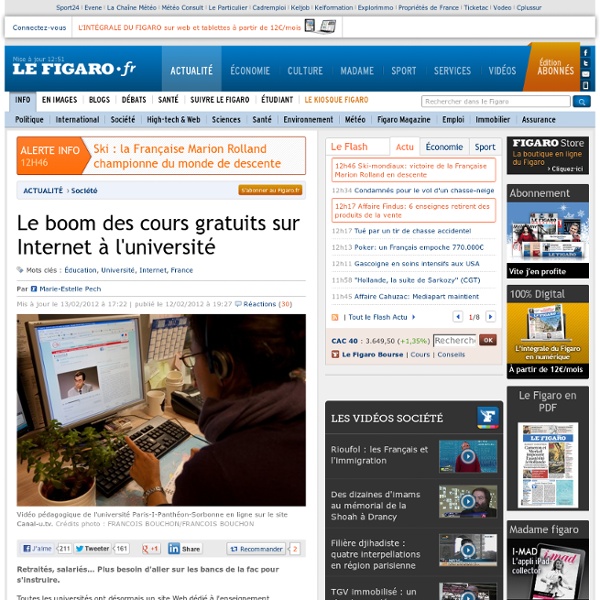20 questions (and answers) about MOOCs « Dave's Educational Blog
I was asked by the excellent Sheryl Nussbaum-Beach to speak to her PLP class about MOOCs, and, while we had what i thought was an excellent forty minute chat, there were tons of comments that i never had the chance to address. As i look over the questions they asked, I see that in answering their questions i have a chance to lay out many of the thoughts that I have had about MOOCs while they have been all the rage here on the internet in the last few weeks. I opened the discussion with a quick personal intro to my contribution to the MOOC discussion and then we moved to Q & A. Feel free to skim along and pick up the part of the discussion that interests you. Intro Edtechtalk and community – 2005 In 2005 Jeff Lebow and I started edtechtalk. What i discovered was that, simply by engaging in random discussions with new people we happened upon – I was learning. Rhizomes 2006 This lead me to new ideas about what it meant to learn and what it meant to know. Q & A. I see it as a win.
Université : vers de nouveaux entrepôts de cours ouverts
Le programme Open CourseWare (Wikipédia) du Massachusetts Institute of Technology, lancé en 2001 et ouvert en 2003 a été un modèle imité depuis par de nombreuses universités de par le monde – et non des moindres. Ce sont désormais plus de 200 universités et plus de 13 000 cours qui sont librement accessibles en ligne via le consortium Open CourseWare, comme s’en félicitait le MIT en avril dernier en fêtant les 10 ans de son programme. Reste que pour l’essentiel, ce matériel se compose de vidéos, de présentations et de textes. S’il est un répertoire de connaissance sans égal, il ne permet pas d’acquérir de diplômes et propose rarement des exercices interactifs pour mieux appréhender les notions que les professeurs dispensent. Est-ce que cela serait en train de changer ? Le 10 octobre, Peter Norvig et Sebastian Thrun, deux spécialistes de l’intelligence artificielle de l’université de Stanford, vont se lancer dans une nouvelle forme de cours gratuits en ligne.
La pédagogie universitaire numérique fera l’objet d’un livre blanc et d’une cartographie
La formation pédagogique des enseignants aux outils numériques avait fait l'objet d'une communication remarquée du ministère de l'Enseignement supérieur lors du dernier Colloque international des universités à l'ère du numérique (CIUEN), à Strasbourg en juin 2010. Pour l'édition 2012, organisée cette fois-ci par l'Université de Lyon, la mission numérique pour l'enseignement supérieur (Mines) s'apprête à dévoiler un « livre blanc » consacré à la pédagogie universitaire numérique, ainsi qu'une « cartographie de la recherche » française sur le sujet. Il y a deux ans, 55 % des enseignants déclaraient ne pas avoir participé à des actions de formation sur l'usage pédagogique des outils numériques. Malgré cela, les usages innovants se sont-ils multipliés ? Un cartographie bientôt accessible sur internet Articles liés :
Paul Larrouturou (PaulLarrouturou) sur Twitter
Techniques innovantes pour l'enseignement supérieur
QCM à corrections rapides- Usages du numérique éducatif
Philippe Gautron, enseignant de SES, interroge ses élèves avec Plickers. Photo : Damien Guittard. Lors des "Rencontres autour du numérique" des enseignants présentent leurs méthodes pour réaliser des questionnaires à choix multiples. Certains utilisent des boitiers de vote ou des programmes en ligne qui permettent aux élèves de répondre par SMS ou en utilisant leur appareil mobile connecté au wifi. (atelier "évaluations stimulantes"). L’université catholique de Louvain publie en septembre 2017 un guide de la classe inversée qui fait le point sur des méthodes pour tirer le meilleur parti des nouveaux outils. • Qu’apportent les outils numériques de télésondage ? Les boitiers de vote ou les applications de sondage permettent d’apporter des informations aux enseignants : Visualiser en temps réel la répartition des réponses permet de sonder l’ensemble des apprenants et plus uniquement quelques étudiants volontaires. • Application Socrative Objectifs : Déroulement
Dramatically Bringing Down the Cost of Education with OER
SOURCE: AP/ Jim Mone A Blaine (MN) High School student is shown with a printed online textbook. Instead of mass-produced textbooks, the more than 3,100 sophomores in the state's largest district are learning from an online curriculum developed by their teachers over the summer with free software distributed over the web. By David Wiley, Cable Green, and Louis Soares | February 7, 2012 Open Educational Resources Download this issue brief (pdf) Read this issue brief on your browser (Scribd) We are in the midst of a revolution in education. The key to this sea change in learning is open education resources, or OER. OER are starting to hit the public consciousness in the form of initiatives like the Khan Academy , MIT OpenCourseware , and Washington’s Open Course Library . OER are already being used by learners for self study, by teachers to enhance classroom learning, and by education providers to bring down the cost of instruction. OER and you Education at its core is sharing The BOGO conundrum
Hélène Chevallier (lnche) sur Twitter



